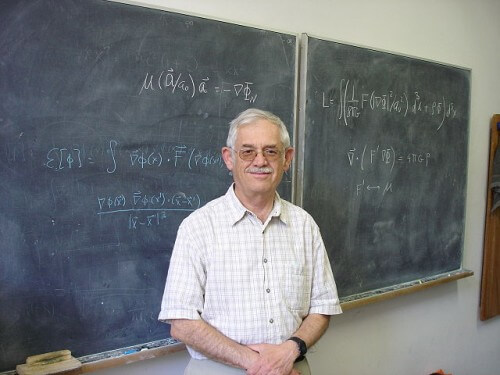Known for his research on black holes, and was the first to show that they also 'leak'

The winner of the Israel Prize in Physics and the winner of the Wolf Prize, Prof. Jacob Bekenstein from the Hebrew University, passed away in Finland last Sunday surprisingly.
Prof. Beckenstein was born in Mexico City in 1947 and immigrated to the USA with his family as a child. He did his undergraduate studies in physics at the Brooklyn Polytechnic Institute, and his doctoral thesis at Princeton University. Two years later, in 1974, he immigrated to Israel.
Prof. Beckenstein held the Polk Chair in Theoretical Physics at the Hebrew University and was a member of the Israel National Academy of Sciences. Prof. Beckenstein is the recipient of the 1988 Rothschild Prize, the 2005 Israel Prize, the 2012 Wolf Prize and the 2014 Einstein Prize of the American Physical Society for his research in the field of black hole entropy.
Prof. Beckenstein was a theoretical physicist who dealt with Einstein's theory of gravity. His main discovery (in collaboration with Stephen Hawking) is that black holes are hot and radiating bodies thanks to the quantum effect. His extraordinary research and works were an asset and he served as a role model for many physicists in Israel and around the world.
When he won the Israel Prize, the members of the committee wrote: "In the early 70s, Prof. Beckenstein proposed to attribute to black holes an entropy that is characteristic of their surface area, and he was internationally recognized as the father of the thermodynamics of black holes. This work of his excels in originality and innovation, and it brought about a thought revolution in this field of physics."
In an article published just recently in the journal Scientific American, under the title: "Is it possible to extract energy from a black hole?” writes Adam Brown Hawking, based on earlier ideas conceived by Jacob D. Bekenstein, who currently works at the Hebrew University of Jerusalem, showed that black holes leak small amounts of radiation. You will still die if you fall in, but even though you yourself will never get out, eventually your energy will escape. This is good news for those who aspire to extract energy from black holes in the future: energy can escape."
In an interview given by Beckenstein himself to the Israeli edition of Scientific American in 2005, following the announcement of his winning the Israel Prize, he believed that he was being recognized and receiving awards for his research in the past, and that his current research could only be evaluated in a long time. In response to the question of Eitan Crane and Haim Shmueli, members of the Scientific American team, "What do you think is your main achievement?" Prof. Bekenstein answered: "There are two answers to this. One is how people see me, and this is expressed in the reasons for receiving the prize given for my work on the thermodynamics of black holes. I started dealing with this in the 70s and it can be said that by the end of the 70s my part of this subject was finished, although there are always implications for later works. The second is from my point of view. Today I'm working on other things and I wouldn't want my whole career to end in the 70's. I think I'm still doing important things, but it takes time for the public, and even the important scientists, to catch on to what you've done. And so the award is actually given for the relatively distant past."

7 תגובות
I'm just a science lover:
May his memory be blessed
Baruch Dayan Emet.
He said true things: "There are things scientists do, but it takes a long time for the public, even scientists, to understand the practical significance of the scientific findings... It will be necessary to educate the masses, including scientists, to think more abstractly:."
Very unfortunate. He was definitely nominated for the Nobel Prize in Physics.
That's how it is with us "hummus tahina chips salad" and the rest can imitate. Scientists are not celebrities
No wonder a large part of the scientific elite is no longer here or on the way out.
Of blessed memory
The late Prof. Jacob Beckenstein was also the recipient of the 2014 Einstein Prize.
It was interesting and disappointing to see that the news of the great scientist's death was published in the newspapers in a very minor way (I think that in the online newspapers the news was published only on two sites - 'Hidan' and 'Arutz 7'). That same week, many detailed publications in the newspapers and in the media in general were devoted to the death of a local Israeli actress, quite famous and talented in her own right, but not a cultural icon or anything close to it, as well as to the coverage of her funeral. Without disparaging the memory of that actress and her importance, the comparison between the scope of the publications in both cases, compared to the cultural importance of the two delays, is quite disappointing, and teaches something about the cultural and intellectual horizon of the media and perhaps also about that of the public as a whole.
Prof. Bekenstein, whose memory is blessed, was a great scientist, a kind teacher and a humble and kind person. His death is a great loss to Israeli science.
My father sent a Japanese supply spacecraft to the space station. Please update